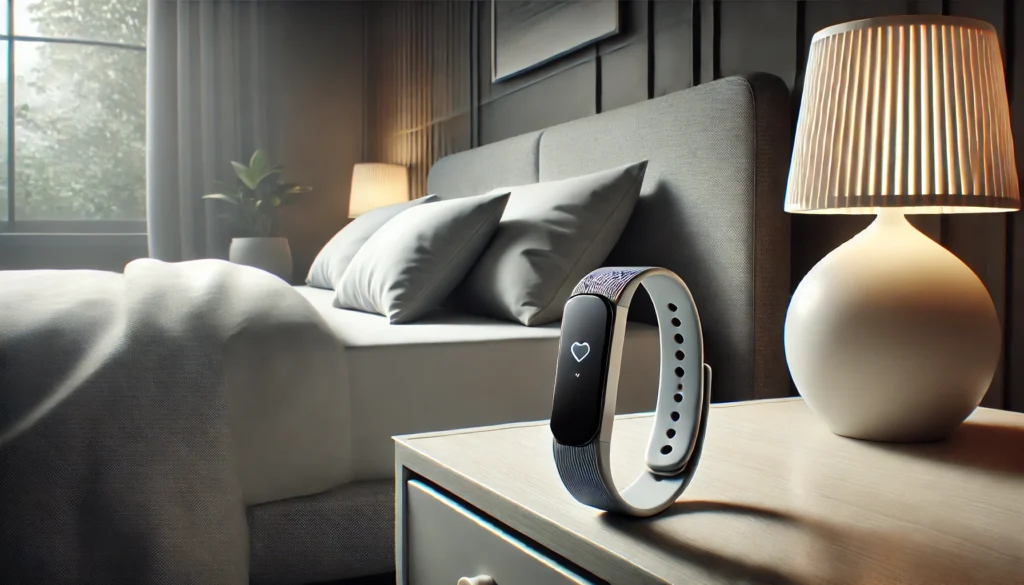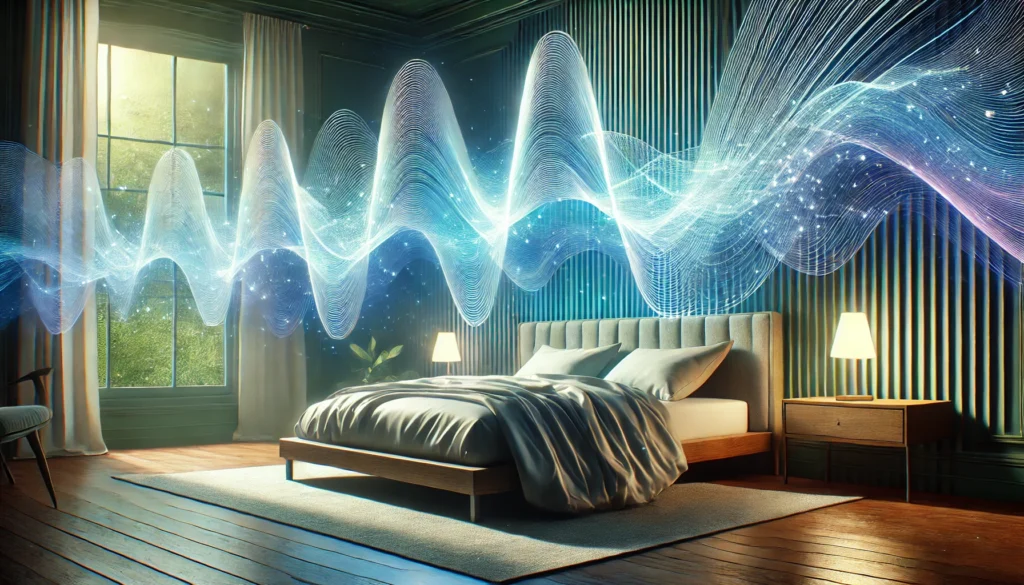Sleep is a complex biological process essential for maintaining optimal health and well-being. It involves a cycle of stages, including REM (Rapid Eye Movement) and non-REM sleep. Deep sleep, a crucial phase of non-REM sleep, is vital for physical recovery, cognitive function, and emotional stability. During this stage, the body repairs tissues, strengthens the immune system, and consolidates memories.
You May Also Like: Ultimate Guide to Sleep Tracker Apps
The Importance of REM vs. Non-REM Sleep
REM sleep is known for its role in dreaming and processing emotions. It helps regulate mood and supports learning by processing emotional experiences. Non-REM sleep, on the other hand, is where the body goes into a state of physical recovery. The alternation between these two stages is crucial for overall well-being. By understanding these phases, users can appreciate why a balanced sleep cycle is necessary.
Challenges in Achieving Deep Sleep
Modern lifestyles are filled with stressors and distractions that can impede deep sleep. Factors like increased screen time, irregular work schedules, and high stress levels contribute to sleep disruptions. Recognizing these challenges helps in identifying the role that technology, such as deep sleep apps, can play in mitigating them. By using these apps, users can gain insights into their sleep patterns and identify potential disruptors.
The Role of Technology in Sleep Science
Technology has paved the way for significant advancements in sleep research. With the advent of sleep tracking devices, we can now gather data on sleep patterns with unprecedented precision. This data is invaluable for researchers and individuals alike, offering insights that were previously inaccessible. Deep sleep apps leverage this technology to provide users with actionable insights to improve their sleep quality.
How Deep Sleep Apps Work
Deep sleep apps are designed with algorithms that analyze sleep patterns and offer personalized insights. They typically use sensors in smartphones or wearable devices to monitor movements, heart rate, and sounds throughout the night. By tracking these variables, the app provides a detailed overview of the user’s sleep cycle, pinpointing periods of light, deep, and REM sleep.
Algorithms and Data Analysis
The algorithms used in deep sleep apps are sophisticated, often employing machine learning techniques to interpret sleep data. These algorithms can differentiate between various sleep stages by analyzing patterns in movement and heart rate. Understanding how these algorithms work can help users appreciate the precision and reliability of the insights provided by the apps.
Integration with Wearable Technology
Wearable technology enhances the functionality of deep sleep apps by providing continuous monitoring of physiological parameters. Devices like smartwatches and fitness bands collect data on heart rate variability and body movement, offering a comprehensive picture of sleep quality. This integration allows for a seamless user experience, making it easier to track sleep patterns over time.
The Science Behind Smart Alarms
Smart alarms are a standout feature of many deep sleep apps, designed to wake users during the lightest phase of sleep. This reduces sleep inertia, the grogginess felt when waking from deep sleep. By analyzing sleep cycles, these alarms time their alerts to coincide with lighter sleep stages, facilitating a more natural and refreshing wake-up experience.

Features of a Deep Sleep App
Sleep Tracking
The primary function is to track the user’s sleep patterns and provide data-driven insights. This feature allows users to understand how long they spend in each sleep stage. By visualizing sleep cycles, users can identify irregular patterns and make informed decisions to optimize their sleep.
Soundscapes and White Noise
Many apps offer a variety of calming sounds to help users fall asleep more easily. These sounds can mask disruptive noises from the environment, creating a serene atmosphere conducive to sleep. From ocean waves to gentle rain, the selection of soundscapes caters to different preferences, helping users drift into slumber.
Smart Alarms
These alarms are designed to wake users during the lightest phase of sleep, reducing grogginess. By setting a window of time for waking, the app determines the optimal moment to sound the alarm. This feature is particularly beneficial for those with irregular sleep schedules, as it promotes a more natural start to the day.
Sleep Coaching
Some apps offer personalized tips and strategies to improve sleep hygiene. By analyzing individual sleep data, the app provides tailored recommendations. This may include advice on bedtime routines, dietary adjustments, or relaxation techniques, empowering users to take proactive steps toward better sleep.
The Benefits of Using a Deep Sleep App
Enhanced Sleep Quality
One of the most significant advantages of using a deep sleep app is the potential improvement in sleep quality. By understanding your sleep patterns, you can make informed decisions to adjust your bedtime routine, optimize your sleep environment, and ensure that you are getting enough deep sleep.
Optimizing Bedtime Routines
A well-structured bedtime routine can significantly enhance sleep quality. Deep sleep apps provide insights into the most effective practices, such as winding down with relaxation techniques or avoiding screens before bed. By following these recommendations, users can create a conducive environment for restful sleep.
Creating a Sleep-Friendly Environment
The sleep environment plays a crucial role in determining sleep quality. Factors like room temperature, lighting, and noise levels can impact how well you sleep. Deep sleep apps often offer suggestions for optimizing your sleep environment, such as using blackout curtains or white noise machines to block out disturbances.
Monitoring Progress Over Time
One of the key benefits of using a deep sleep app is the ability to track progress over time. By regularly reviewing sleep data, users can assess the effectiveness of changes made to their routines or environment. This ongoing feedback loop encourages continuous improvement and helps maintain healthy sleep habits.
Improved Cognitive Function
Deep sleep is essential for cognitive processes, including memory consolidation and problem-solving. By optimizing deep sleep, users may experience enhanced mental clarity, improved focus, and better decision-making abilities.
Enhancing Memory and Learning
During deep sleep, the brain processes and consolidates information acquired throughout the day. This stage is crucial for memory retention and learning. By ensuring adequate deep sleep, users can enhance their cognitive capabilities, making it easier to absorb new information and recall past experiences.
Boosting Focus and Productivity
A well-rested mind is more alert and capable of sustained focus. By tracking sleep patterns, users can identify factors that may be affecting their ability to concentrate. Deep sleep apps provide insights into optimizing sleep, which can lead to increased productivity and improved performance in daily tasks.
Supporting Emotional Regulation
Emotional stability is closely linked to sleep quality. Deep sleep plays a role in processing emotions and regulating mood. By using a deep sleep app, users can gain insights into how their sleep patterns affect their emotional well-being, allowing them to take proactive steps to maintain balance.
Stress Reduction
Chronic stress is a common sleep disruptor. Many deep sleep apps incorporate mindfulness exercises, guided meditations, and breathing techniques designed to reduce stress levels, promoting a state of relaxation conducive to sleep.
Mindfulness and Meditation Practices
Mindfulness exercises and guided meditations are effective tools for reducing stress and promoting relaxation. Deep sleep apps often include these features, allowing users to engage in calming practices before bedtime. By incorporating mindfulness into their routine, users can create a mental state conducive to restful sleep.
Breathing Techniques for Relaxation
Breathing exercises are a simple yet powerful way to alleviate stress and prepare the body for sleep. Many deep sleep apps offer guided breathing sessions that help users focus on their breath, promoting relaxation and reducing anxiety. These techniques can be easily integrated into a nightly routine for improved sleep quality.
Reducing the Impact of Daily Stressors
By tracking sleep patterns, users can identify how stressors impact their sleep quality. Deep sleep apps provide personalized insights that help users understand the relationship between stress and sleep. Armed with this knowledge, individuals can implement strategies to manage stress more effectively, ultimately enhancing their sleep.

Personalized Insights and Recommendations
Deep sleep apps offer tailored advice based on individual sleep data. These insights help users identify potential sleep disruptors, such as caffeine intake or screen time, and suggest modifications to improve sleep hygiene.
Identifying Sleep Disruptors
By analyzing sleep data, deep sleep apps can pinpoint habits or environmental factors that may be negatively affecting sleep quality. This might include late-night caffeine consumption, excessive screen time, or irregular sleep schedules. Identifying these disruptors is the first step toward making meaningful changes.
Customizing Sleep Strategies
Each individual’s sleep needs are unique. Deep sleep apps provide personalized recommendations that cater to these differences. Whether it’s adjusting bedtime routines, altering dietary habits, or incorporating relaxation techniques, these tailored strategies empower users to take control of their sleep health.
Empowering Informed Decision-Making
With detailed insights and recommendations at their fingertips, users can make informed decisions about their sleep habits. By understanding the impact of various factors on sleep quality, individuals can take proactive steps to optimize their routines and environments, leading to more restful nights.
Convenient and Accessible
With smartphones being a ubiquitous part of modern life, deep sleep apps provide a convenient way to monitor sleep without requiring additional gadgets. This accessibility makes it easier for users to incorporate sleep tracking into their daily routines.
Seamless Integration with Daily Life
Deep sleep apps are designed to fit seamlessly into users’ daily lives. With the convenience of mobile devices, individuals can monitor their sleep patterns without the need for additional equipment. This ease of use encourages consistent tracking and engagement with the app.
Accessibility for Diverse Populations
The widespread availability of smartphones ensures that deep sleep apps are accessible to a broad audience. Regardless of age or tech-savviness, individuals can benefit from the insights provided by these apps. This accessibility promotes widespread adoption and encourages individuals to prioritize their sleep health.
Encouraging Consistent Use
The convenience and accessibility of deep sleep apps encourage regular use, which is essential for accurate data collection and meaningful insights. By incorporating sleep tracking into their routine, users can gain a comprehensive understanding of their sleep patterns and make informed decisions to enhance their sleep quality.
Current Trends in Sleep Technology
The field of sleep technology is rapidly evolving, with innovations that promise to redefine how we approach rest and recovery. Current trends include the integration of artificial intelligence to provide more accurate sleep analysis and the use of biometric data to deliver real-time feedback.
Artificial Intelligence and Machine Learning
AI and machine learning are revolutionizing the way sleep data is analyzed. These technologies enable deep sleep apps to provide more precise insights by recognizing patterns and anomalies in sleep behavior. The result is a more personalized user experience, with recommendations tailored to individual needs.
Biometric Data and Real-Time Feedback
The use of biometric data is becoming increasingly common in sleep technology. By monitoring physiological parameters such as heart rate and body temperature, deep sleep apps can offer real-time feedback on sleep quality. This immediate insight allows users to make timely adjustments to their routines for optimal results.
Virtual Reality and Immersive Sleep Experiences
Virtual reality is emerging as a novel tool in sleep technology. By creating immersive environments, VR can facilitate relaxation and promote a state conducive to sleep. Users can experience calming landscapes or guided meditations, enhancing their ability to unwind and prepare for rest.
Future Implications
The implications of widespread adoption of deep sleep apps extend beyond individual benefits. On a societal level, improved sleep quality can lead to reduced healthcare costs, increased productivity, and enhanced quality of life.
Societal Benefits of Improved Sleep
As more individuals optimize their sleep, society as a whole stands to benefit. Improved sleep quality can lead to a reduction in sleep-related health issues, ultimately decreasing healthcare costs. Additionally, well-rested individuals are more productive, contributing positively to the economy.
Opportunities for Health and Wellness Professionals
For health and wellness coaches, deep sleep apps offer a valuable tool to support client goals. By providing data-driven insights, these apps complement professional guidance, empowering clients to take charge of their sleep health. This integration can enhance coaching effectiveness and lead to better outcomes.
Research and Exploration in Sleep Science
Science journalists and researchers have an opportunity to delve deeper into the impacts of sleep technology on public health. By exploring the broader implications of widespread app adoption, they can uncover new insights into the relationship between sleep and overall well-being.

Practical Advice for Maximizing the Benefits of a Deep Sleep App
To get the most out of a deep sleep app, users should:
Set Consistent Sleep Schedules
Aim for regular sleep and wake times to regulate the body’s internal clock. Consistency helps reinforce the body’s natural circadian rhythms, promoting better sleep quality. By setting and sticking to a schedule, users can create a stable routine that supports restorative sleep.
Create a Sleep-Conducive Environment
Keep the bedroom cool, dark, and quiet, and limit exposure to screens before bed. A comfortable sleep environment can significantly impact sleep quality. Deep sleep apps often provide tips for optimizing the bedroom, such as using blackout curtains or noise machines.
Use the App Regularly
Consistent use allows for more accurate data collection and better insights. Regular engagement with the app ensures that users receive the most relevant and personalized recommendations. By making sleep tracking a habit, individuals can gain a comprehensive understanding of their sleep patterns.
Incorporate Relaxation Techniques
Utilize the app’s features to engage in mindfulness and relaxation exercises before sleep. Techniques such as guided meditations or breathing exercises can help calm the mind and prepare the body for rest. By incorporating these practices into their routine, users can enhance their overall sleep experience.
In conclusion, deep sleep apps offer a technologically advanced approach to tackling sleep challenges, providing users with valuable insights and tools to enhance their sleep quality. As technology continues to evolve, these apps are poised to become an integral part of our wellness toolkit, bridging the gap between scientific understanding and practical application. Whether you are a health coach, journalist, or biohacker, embracing this technology can pave the way for a more restful and rejuvenating sleep experience.
Further Reading:
Sleep Apps and the Benefits They Bring to Your Life
How to Get More Deep Sleep: Tips for a Restful Night
Important Note: The information contained in this article is for general informational purposes only, and should not be construed as health or medical advice, nor is it intended to diagnose, prevent, treat, or cure any disease or health condition. Before embarking on any diet, fitness regimen, or program of nutritional supplementation, it is advisable to consult your healthcare professional in order to determine its safety and probable efficacy in terms of your individual state of health.
Regarding Nutritional Supplements Or Other Non-Prescription Health Products: If any nutritional supplements or other non-prescription health products are mentioned in the foregoing article, any claims or statements made about them have not been evaluated by the U.S. Food and Drug Administration, and such nutritional supplements or other health products are not intended to diagnose, treat, cure, or prevent any disease.


